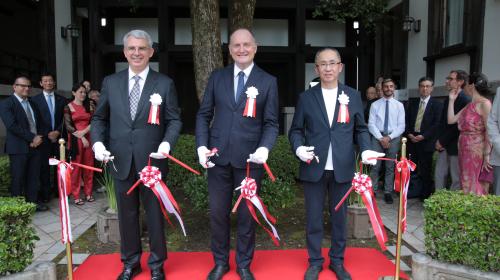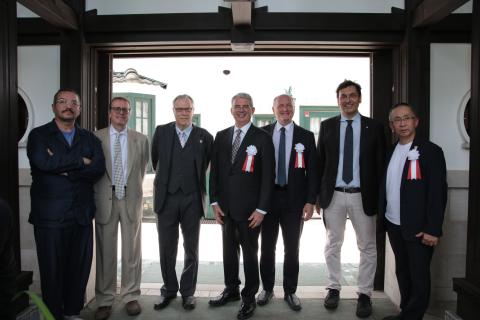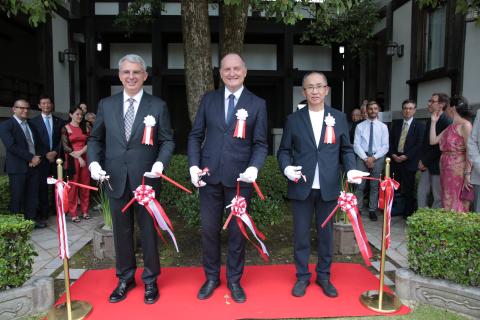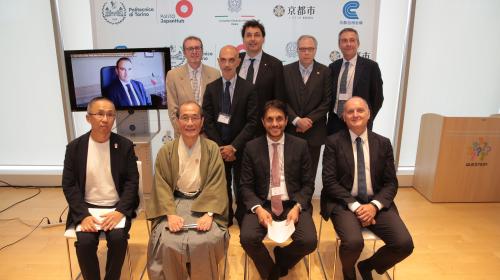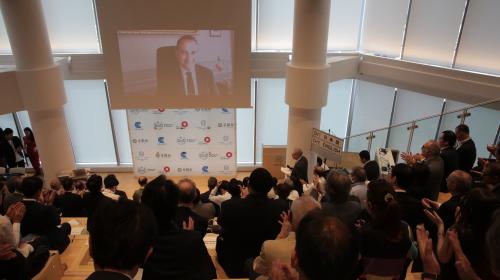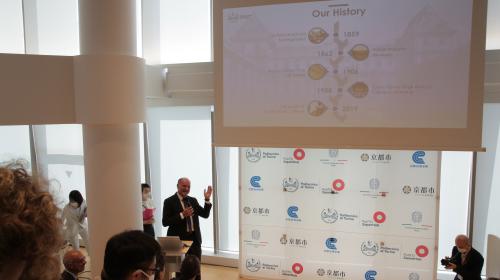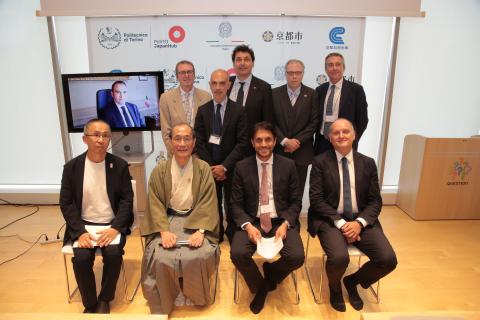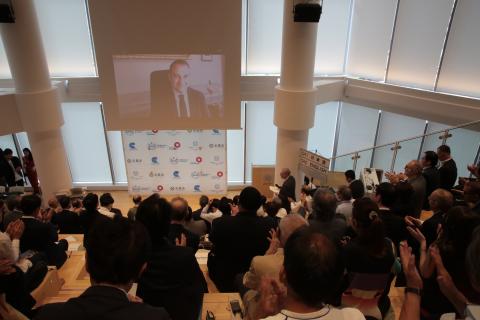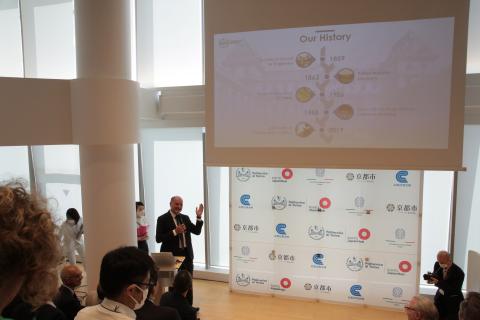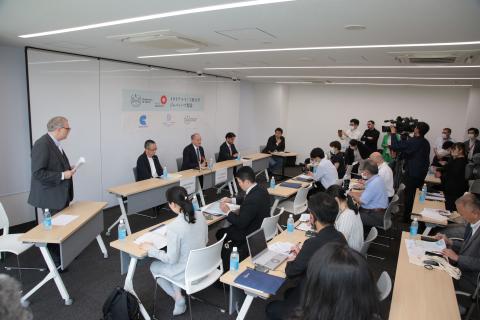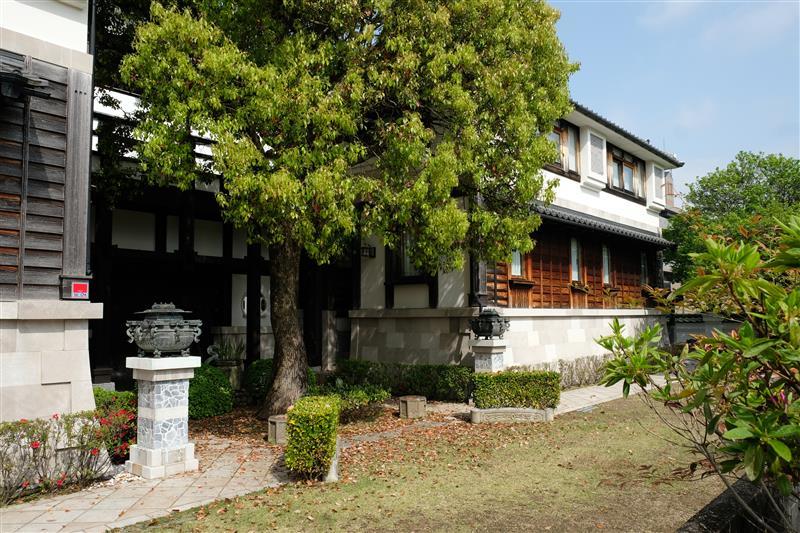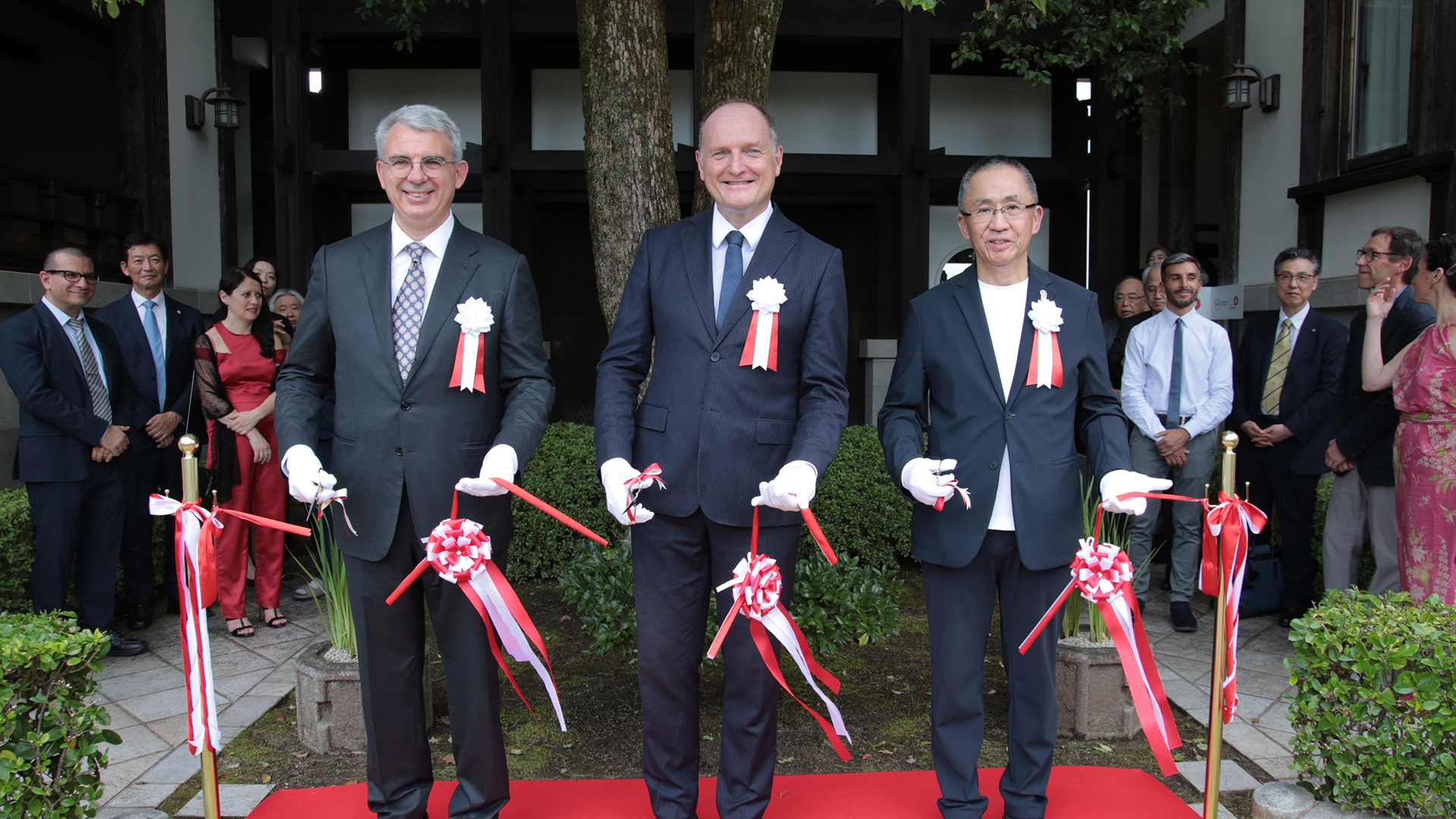
Politecnico inaugurates its Japan Hub in Kyoto
The third-largest economy in the world, Japan is one of the most modern and advanced economic systems in the world, strengthened by its geographic position in the Asia-Pacific region-one of the most economically dynamic quadrants on a global scale-and a traditional international projection. Politecnico boasts a solid link in research and education with the Land of the Rising Sun, with more than 20 collaborations with Japanese universities: joint projects and initiatives have generated, in the five-year period 2017-2021, projects worth more than one million euros and numerous joint scientific results by more than 50 faculty, researchers and technical-administrative staff.
Relying on this fruitful collaboration, and with the participation of the Embassy of Italy Gianluigi Benedetti, Politecnico di Torino inaugurates today its PoliTO Japan Hub in Kyoto, the first independent office of an Italian university in the country. The aim is creating new synergies and networks for research activities and collaborations with companies and organizations, with the involvement of actors in the Kyoto area and all over Japan.
The Japan Hub was born as an antenna of Politecnico in Japan, a country that is crucial for science and technology and has numerous challenges in common with Italy, such as the management of environmental risks, an ageing society and the enhancement and protection of the cultural heritage.
The hub aims to coordinate, promote and enhance the university’s activities in education, research, innovation and knowledge share. It pursues academic, industrial and reputational objectives, working with Politecnico's dense network of Japanese partners built up over the years. The hub will also benefit its local territory in Torino and the whole country.
Japan is opening a fruitful season of industrial collaborations also aimed at institutions and universities. “Politecnico di Torino decided to consolidate and boost its thirty-year-long cooperation with Japan by creating an independent hub – the first among Italian universities – aimed at professors and researchers, to create new synergies and networks, together with Italian local actors. There are several reasons why Politecnico di Torino chose Kyoto as its significant base in Japan. First of all, Kyoto City is the center of Japan's academy, with more than 30 public and private universities. Furthermore, Kyoto is the city where the Japan-Italy exchange project began with the establishment of a Double Degree Program in Engineering at the Kyoto Institute of Technology. Kyoto retains its historical importance in the fields of innovation and academic and industrial research, while maintaining the characteristics and advantages of a metropolis. It is also geographically located in an advantageous site for interacting with other nodes in Japan. It is an ideal environment to embody a dignified cultural center that plays a historical and philosophical role (philosophy of wabi-sabi) that has had a strong influence on modern Japan. The aim is starting from Kyoto to consolidate our relations within the whole country”, explains Guido Saracco, Rector of Politecnico.
The Politecnico di Torino Japan Hub will then be a shared working space for Politecnico’s professors and researchers, in collaboration with Kansai region’s actors, with whom Politecnico desires to consolidate and start new collaborations. It will also be a meeting place for Italian and Japanese cultures, as evidenced by the photo installation curated by the Fondazione Torino Musei, Museo d'Arte Orientale and Museo Casa Mollino, in the Hub premises: “Perfect as an egg, Mollino visits Kyoto. Photographs by Brigitte Schindler” (visits by appointment: japan.hub@polito.it). The photographs reveal the private apartment of Carlo Mollino, a world-famous architect in the 20th century and a former professor at the Politecnico.
A place for academic, cultural, industrial and institutional relations, the Japan Hub will also be a contact point for anyone interested in Torino and Politecnico study offer. The Hub is particularly interested into being an international testbed for a new educational model of contamination between technical disciplines and Humanities.
New agreements with Japanese universities
Besides consolidating the most significant current academic collaborations, the Hub goal will be signing new agreements, especially at the Ph.D. level. Therefore, Politecnico finalized several new collaborations with universities in Kyoto and Kansai region.
A Double Ph.D. Agreement on Bioengineering is under establishment together with Kansai Medical University, involving young Italian and Japanese researchers and combining PoliTO engineering skills with KMU medical knowledge.
Ryukoku University, will work together Politecnico within an existing project in collaboration with the Kyoto Shinkin Bank: its Question incubator will support entrepreneurship activities in rural zones and disadvantaged regions.
Kyoto University has likewise been asked for further collaborations, while consolidating the ongoing ones with the Kyoto Institute of Technology.
Politecnico also signed a five-year-long agreement with Kobe Design University, in order to further cooperation in areas of mutual interests, including but not limited to the subject of Design. Both Universities will promote academic and student mobility; including staff exchange, study abroad programs and joint research programs.
Finally, collaboration is also growing in Tokyo, where on 13 July an important workshop on robotics issues will take place – promoted by Polito and Tokyo Institute of Technology, with the participation of the Italian Embassy – with the aim of promoting collaboration both in the scientific and for industrial applications.
“The Japan Hub has a number of characteristics on which we are strategically focusing: a location that is independent from local universities, so as to move flexibly within the network of institutional, academic and corporate partners - adds Michele Bonino, who is in charge of the Japan Hub’s scientific management. “Furthermore – Bonino continues - the Politecnico brings to the Hub a solid partnership with institutions of the Turin system: our antenna in Japan can immediately be a reference also for our territories. Today’s presence in Kyoto of the Industrial Union, the Museum of Asian Art, the Turin Museums Foundation and the I3P incubator shows how this potential has been seized".
Industrial collaborations
As already said, the Hub will facilitate and promote industrial and entrepreneurial collaborations between Italy and Japan, this being a promising sector. Politecnico will share its research and development knowledge, plus its skills in consulting and relationship building between companies in the two countries.
“The Japan Hub is designed to be our antenna in Japan that can coordinate, promote and enhance our activities, particularly in the areas of research and innovation - explains David Chiaramonti, Vice Rector for Internationalization of Politecnico di Torino - We will build on the great reputation that Italian architecture and design enjoy in the Far East, to also develop initiatives for industrial collaboration, technology development and policy support”.
“Traveling parallel courses toward modernity, Italy and Japan have developed very different national identities. Italy features individual passion and eccentric creativity, while Japan promotes social unity and efficiency. However, these two different approaches could be extremely synergic, both in basic science and industrial development. Politecnico di Torino, with its long and fruitful international experience, has sharply captured this concept and created the first independent Italian Academic HUB in Japan. The HUB will combine Italian creativity and passion with Japanese efficiency and organization, thus creating an ideal venture for both science and business", the Director of Politecnico di Torino Japan Hub Giuseppe Pezzotti concludes.
With the aim of strengthening industrial relations, a seminar was organized on the occasion of the Hub's inauguration in the framework of QUESTION, the branch through which Kyoto Shinkin Bank creates new value and provides it to the community by means of diverse activities both internationally and in Japan. This event remarks the collaboration between Politecnico and the Kyoto Shinkin Bank, aimed at developing a collaboration project within the frame of QUESTION for facilitating connections and collaborations between SMEs hosted by the incubator and the ones residing in the Italian region of Piemonte where PoliTO operates. The seminar hosted the Consul General of Italy in Osaka Marco Prencipe, the Mayors of Kyoto and Turin (the latter in connection) and the President of the Shinkin Bank, Takayuki Sakakida. The round table was also attended by the President of the Innovative Business Incubator of the Politecnico di Torino - I3P, Giuseppe Scellato, and several Italian and Japanese business leaders: the head of the Technology, Innovation and Research Area Unione Industriali di Torino Guido Ceresole, Domenico Allocca of Versalis (part of Eni group in Italy, a company engaged in the development of energy solutions) and representatives of the Question incubator of the Kyoto Shinkin Bank, the YKK, the Osaka-based Morita Kagaku Kogyo (the pioneer of plant-derived stevia sweeteners), the optical/medical/industrial measurement device developer Otsuka Electronics of the multinational Otsuka Group, and Tsubaki Nakashima Co. (manufacturer of precision balls and rollers and other mechanical parts, based in Nara).

